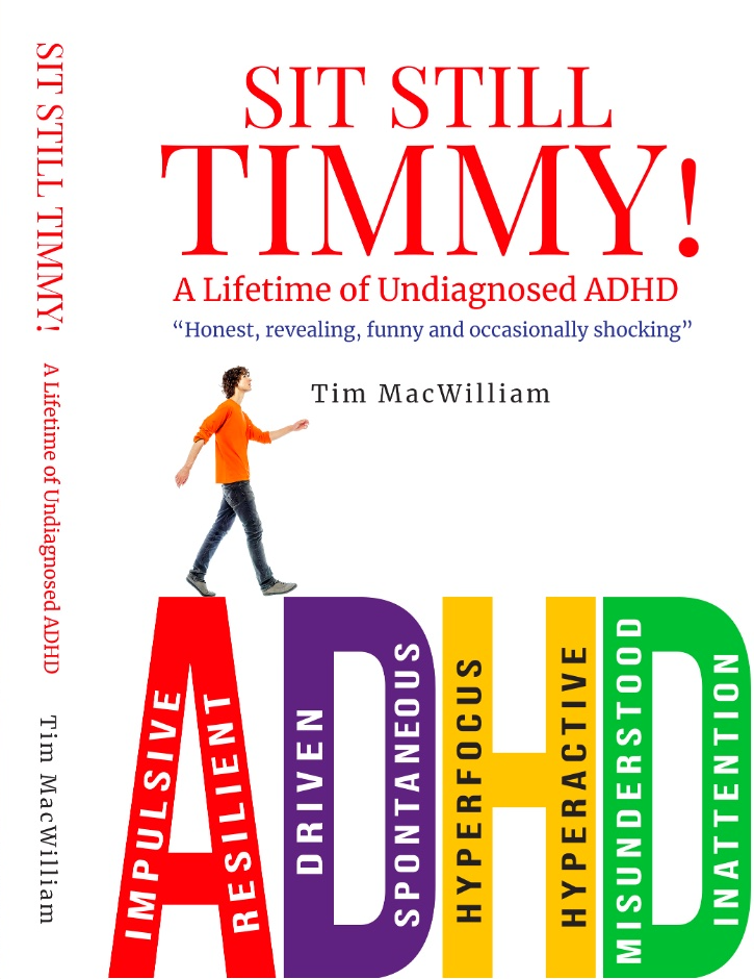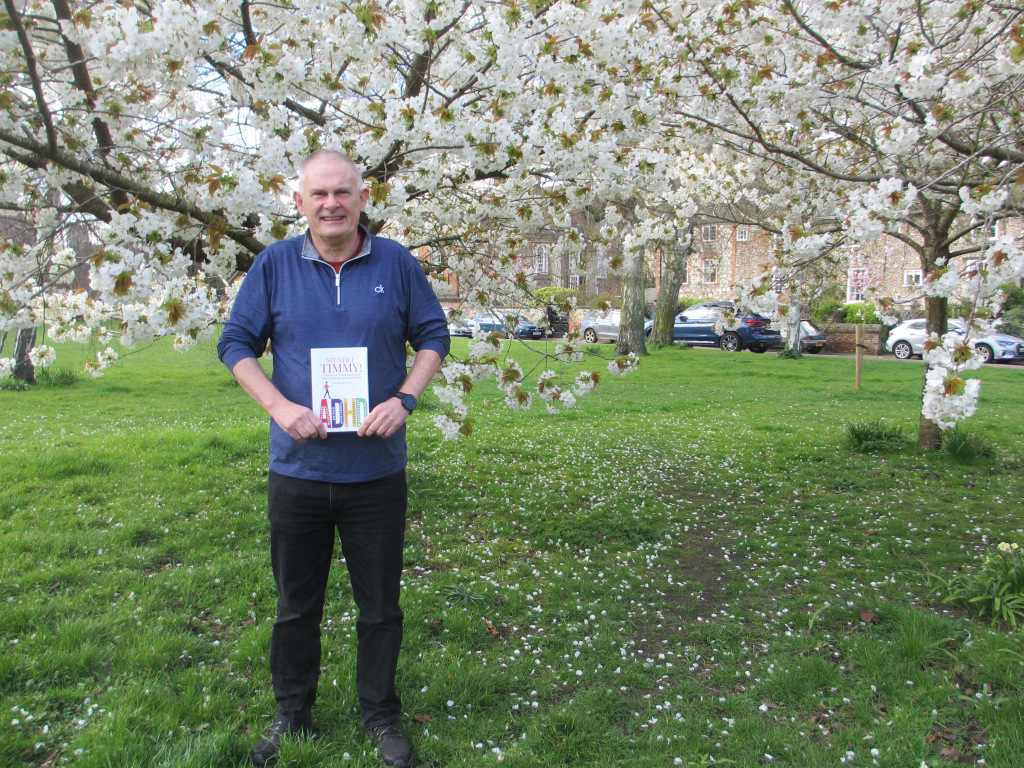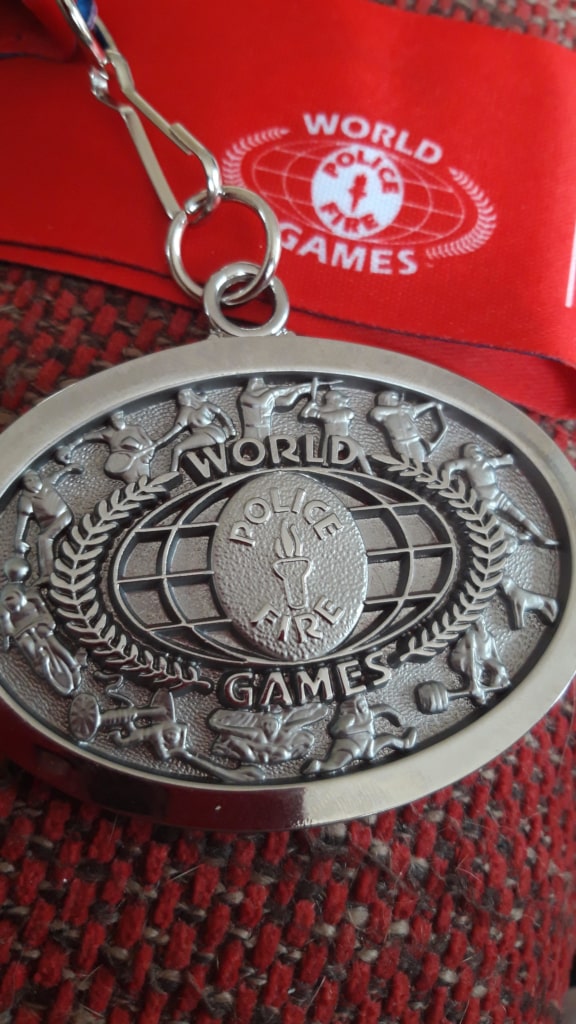Tim Macwilliam loses things a lot. He's lost his keys in the sea several times. One time, he lost his daughter – at the beach in Lowestoft.
“The James Bulger thing had just happened – that atrocity – I thought 'I mustn't lose Vicky today – crowded beach in Lowestoft, packed out.'” But he did.
“Couldn't find her anywhere. And I'd made so sure I wouldn't lose her.”
Tim didn't panic – what he now knows is his ADHD 'hyperfocus' kicked in. He searched the beach, giving people his daughter's description. Finally, he asked at an ice-cream counter.
“She looked at me a bit strange, I walked away, and then she said, 'Sir! Sir! There's a little girl, sitting on your shoulders!'”
Vicky had not been lost. She'd been having a lovely ride on her father's back.
This was one of Tim's stories of life with ADHD.
In March this year, Tim won the 2023 East Anglian Book Award for memoir and biography. He wrote his book, Sit Still Timmy!, about having lived most of his life not realising that he had ADHD.
Tim was officially diagnosed with ADHD at the age of 58, after his daughter Vicky, who now works in mental health, suggested that he might have the condition.
He remembers the moment very well. “I did this commentary for the partially-sighted at Carrow Road - terrible game, Norwich against Stoke.
“I walked back to my daughter's flat. I was going through a terrible time, depression.”
On this day, he talked to his daughter about how he was feeling.
“She says, 'Do you think you might have ADHD?' Oh! Maybe! I looked it up, and it all made sense.”
Tim now knows much more about ADHD than he used to. For example, he said: “There's a chapter in Sit Still Timmy! which I've done called 'Toxic Outriders', and it's all the things which velcro to ADHD.” Tim said that things like depression, OCD, anxiety, autism and even epilepsy can all be associated with ADHD in various ways.
Tim said that a lot of people with ADHD are “misdiagnosed” with depression. He said people with ADHD often “don't understand what's going on,” but “get upset because they're not being understood.” This can lead to depression. However, when these people seek help, their ADHD can be missed by the health professionals, who see the result, but miss the cause.
That said, there are advantages to a life with ADHD, Tim said: “Thinking outside the box, hyperfocus, multitasking. It's a bit like on the radio, when something goes wrong, or someone's talking in your ear while you're talking and looking at the computer – I can do all that, I love doing that. But other people, they can't do that, or they don't love it.”
Since his book was released, Tim says he's been contacted by people from around the world, asking for advice.
He said, “It's not something I'm qualified to give, so I try to be a 'hub' to point them in the right direction.
“But I can't always resist giving my thoughts. For example, a grandmother in America contacted me to say their adult son had ADHD and was addicted to drugs. His daughter, their granddaughter, also had ADHD and was tearing the house down with her limitless energy. They simply couldn't cope and asked me if I could help.

“Fortunately I knew of someone in the USA who specialised in ADHD and addiction. I also suggested their young granddaughter took up judo or karate as it would help her burn off energy and might give her some focus.
“They sent a nice email back to thank me and say my advice had helped. But of course, everyone should contact a qualified practitioner.”
Tim's book, ‘Sit Still Timmy! A Lifetime of Undiagnosed ADHD’ is available online and at various bookshops. Tim has also provided some excerpts of his memoir, for readers of Wymondham Magazine.
People with ADHD are known to continually lose or misplace their belongings. I lose things all the time. It usually doesn’t cause too much concern, but today I have lost my two-year-old daughter on a crowded beach in Suffolk, resulting in an ice-cold electric shock of terror slicing through my brain and down my spine.
The atrocity of James Bulger’s shocking abduction and murder had recently been in the news headlines. The horror of the story kept me, like many other parents, awake at night. The fear this incident invoked created a nationwide rush to buy child leads. A short plastic curly rope with a Velcro handcuff that could be attached to the wrist of a child and their accompanying parent.
In reality, one hasty tug either way and you were left with a piece of plastic minus a child.
I had been particularly vigilant that day, holding my youngest daughter close to me among the crowds. There was no way I would let her go, and I certainly didn’t think I would need a child lead. But, somehow, I had lost my concentration, and she had vanished into the brightly coloured throng of beachgoers. I quickly found a wall with a higher vantage point to see if I could spot her, but it was like looking for the proverbial needle in a haystack. I frantically asked anyone I passed or bumped into if they had seen her. But, all I got in return was a disinterested shrug or a brief shake of their head, with others just staring right through me. By now, my brain was completely focused, even amidst the horror of the unfolding nightmare. ADHD minds are supposedly good in a crisis, as the thought process is so fast, and a solution can often be found extremely quickly. This situation was a true test of that particular theory.
I described what she looked like to anyone who would stop long enough to listen.
‘Her name is Victoria, she has short light brown hair and is wearing a brightly coloured orange and yellow cotton dress with matching shoes, she is two years old!’
The panic rose in my voice with each person I asked. However, it was like describing any number of kids on the crowded beach dressed in bright colours that day. I was about to move on from yet another shaking head to the next person when a lady with an Italian accent shouted from the nearby ice cream stand.
‘Sir! Sir! Your daughter!’
‘Yes! Where? Have you seen her? Where?’
‘I think she is maybe sitting on your shoulders.’
‘What?’ I replied, now stunned and confused.
She offered me a wry smile. ‘A little girl is sitting on your shoulders.’
Vicky looked down at me with a bemused look on her face clutching onto her teddy with one hand and the sleeve of my t-shirt scrunched into the other. She was no doubt wondering what on earth was going on.
‘Is that her?’ continued the lady from the ice cream stall.
‘Ah yes … thank you!’ I’d forgotten I’d lifted her onto my shoulders for safekeeping.















